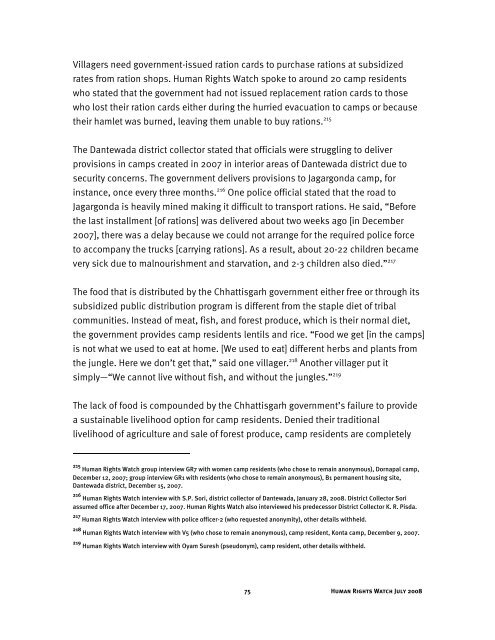âBeing Neutral is Our Biggest Crimeâ - Global Coalition to Protect ...
âBeing Neutral is Our Biggest Crimeâ - Global Coalition to Protect ...
âBeing Neutral is Our Biggest Crimeâ - Global Coalition to Protect ...
You also want an ePaper? Increase the reach of your titles
YUMPU automatically turns print PDFs into web optimized ePapers that Google loves.
Villagers need government-<strong>is</strong>sued ration cards <strong>to</strong> purchase rations at subsidized<br />
rates from ration shops. Human Rights Watch spoke <strong>to</strong> around 20 camp residents<br />
who stated that the government had not <strong>is</strong>sued replacement ration cards <strong>to</strong> those<br />
who lost their ration cards either during the hurried evacuation <strong>to</strong> camps or because<br />
their hamlet was burned, leaving them unable <strong>to</strong> buy rations. 215<br />
The Dantewada d<strong>is</strong>trict collec<strong>to</strong>r stated that officials were struggling <strong>to</strong> deliver<br />
prov<strong>is</strong>ions in camps created in 2007 in interior areas of Dantewada d<strong>is</strong>trict due <strong>to</strong><br />
security concerns. The government delivers prov<strong>is</strong>ions <strong>to</strong> Jagargonda camp, for<br />
instance, once every three months. 216 One police official stated that the road <strong>to</strong><br />
Jagargonda <strong>is</strong> heavily mined making it difficult <strong>to</strong> transport rations. He said, “Before<br />
the last installment [of rations] was delivered about two weeks ago [in December<br />
2007], there was a delay because we could not arrange for the required police force<br />
<strong>to</strong> accompany the trucks [carrying rations]. As a result, about 20-22 children became<br />
very sick due <strong>to</strong> malnour<strong>is</strong>hment and starvation, and 2-3 children also died.” 217<br />
The food that <strong>is</strong> d<strong>is</strong>tributed by the Chhatt<strong>is</strong>garh government either free or through its<br />
subsidized public d<strong>is</strong>tribution program <strong>is</strong> different from the staple diet of tribal<br />
communities. Instead of meat, f<strong>is</strong>h, and forest produce, which <strong>is</strong> their normal diet,<br />
the government provides camp residents lentils and rice. “Food we get [in the camps]<br />
<strong>is</strong> not what we used <strong>to</strong> eat at home. [We used <strong>to</strong> eat] different herbs and plants from<br />
the jungle. Here we don’t get that,” said one villager. 218 Another villager put it<br />
simply—“We cannot live without f<strong>is</strong>h, and without the jungles.” 219<br />
The lack of food <strong>is</strong> compounded by the Chhatt<strong>is</strong>garh government’s failure <strong>to</strong> provide<br />
a sustainable livelihood option for camp residents. Denied their traditional<br />
livelihood of agriculture and sale of forest produce, camp residents are completely<br />
215 Human Rights Watch group interview GR7 with women camp residents (who chose <strong>to</strong> remain anonymous), Dornapal camp,<br />
December 12, 2007; group interview GR1 with residents (who chose <strong>to</strong> remain anonymous), B1 permanent housing site,<br />
Dantewada d<strong>is</strong>trict, December 15, 2007.<br />
216 Human Rights Watch interview with S.P. Sori, d<strong>is</strong>trict collec<strong>to</strong>r of Dantewada, January 28, 2008. D<strong>is</strong>trict Collec<strong>to</strong>r Sori<br />
assumed office after December 17, 2007. Human Rights Watch also interviewed h<strong>is</strong> predecessor D<strong>is</strong>trict Collec<strong>to</strong>r K. R. P<strong>is</strong>da.<br />
217 Human Rights Watch interview with police officer-2 (who requested anonymity), other details withheld.<br />
218 Human Rights Watch interview with V5 (who chose <strong>to</strong> remain anonymous), camp resident, Konta camp, December 9, 2007.<br />
219 Human Rights Watch interview with Oyam Suresh (pseudonym), camp resident, other details withheld.<br />
75<br />
Human Rights Watch July 2008
















